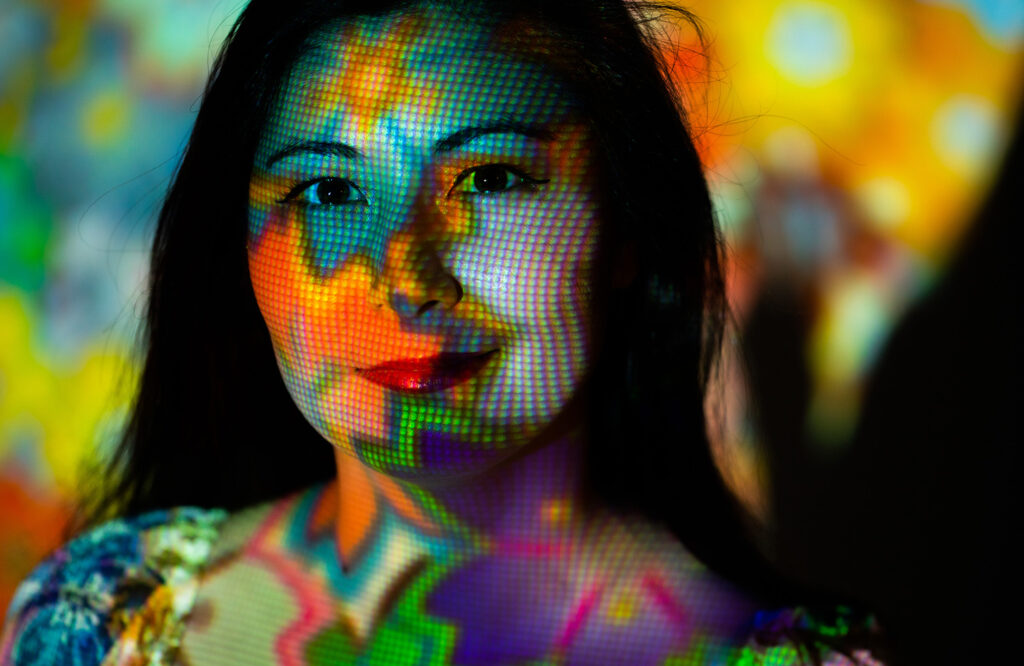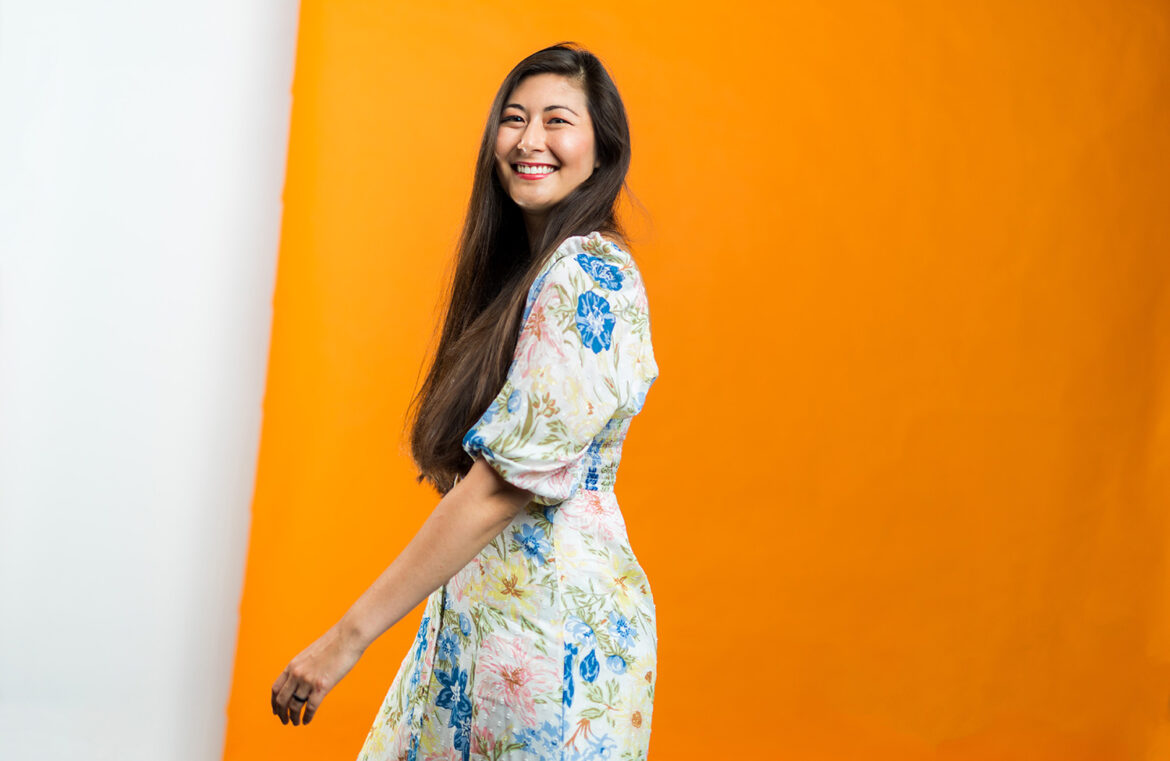Five years after graduation, Azsha White reflects on how the university shaped her future.
“It’s actually pronounced Asia,” says Azsha (Treanor) White. Her dad made up the name, not realizing that in 10th grade White’s classmates would pick up on the correlation, dubbing her Azsha the Asian. “And then I got married, and I became Azsha White, and that’s what I am: half Asian, half white.” She laughs at the coincidence.
If you’ve attended the Knox Asian Festival it’s likely you’ve seen her, or at least heard her voice. White, a professional event host and voice actress with clients in 14 countries, was the festival’s first emcee while a freshman at the University of Tennessee, Knoxville, where she graduated in 2017 with a degree in global studies. “If Azsha wasn’t there the first year, I don’t think we could’ve started it,” says Kumi Alderman, founder of the Asian Culture Center of Tennessee, which organizes the festival.
In 2014, Alderman, who is Japanese, was part of a group interested in organizing a celebration of Asian culture. She knew UT’s International House organized a yearly international festival. “UT brings the world to Knoxville,” Alderman says. When she visited campus she met White, who was a student worker at the I-House in her second semester of college. Alderman shared her plans, and White jumped at the opportunity to get involved. That first year she organized the student tables and volunteers for the festival at Krutch Park, with about 3,000 people in attendance. The Knox Asian Festival now draws 60,000 attendees, and White, who’s taken on a community outreach role, is regularly on television and radio promoting it.
It’s a surprising twist when you consider that White, despite being half Korean, grew up in rural Fayette County, Tennessee, with little connection to Asia outside of her mother’s cooking. “I didn’t call myself Asian until kids in school started telling me that’s what I was,” says White. “And other Asians didn’t see me as Asian because I didn’t speak Korean and I was born here.”
At UT White found a place where, for the first time, she didn’t have doubts about who she was and could fully embrace her heritage. “It was the first time I found a place that really felt my own,” White says.
When she met with her high school guidance counselor at Hutchison School in Memphis, White already had a goal of earning a degree in communication to prepare for a career in acting or the media. She assumed those opportunities were only going to be available in big cities on the coasts. But UT was financially feasible, and the programs in its College of Communication and Information offered her an opportunity to learn how to operate a camera and be comfortable in front it.
Making Things Happen
After attending UT’s Ignite Outdoors orientation program and the Leadership Summit, where she learned about Volunteer values, White knew she had made the right decision. “I realized that if you just knock on as many doors as possible, if you can communicate with people and you have that drive, then you can make things happen regardless of where you are,” White says. “It may not be the exact way that you thought it was gonna happen, but you can still make things happen.”
During Welcome Week, White saw a dance party happening in the parking lot at the I-House. She was pulled in by the energy. By the next semester she was working at the front desk, meeting people from every part of the world. Finally she was getting answers to questions about who she was and what she was meant to do. In a paper for an anthropology class she described her quest to find answers about where she fit in. “My father was in the Air Force and he had traveled the world, so I knew there was more out there,” she remembers writing. “Then I get to the International House, and there are these people from everywhere. And even though we’re all so vastly different, I actually felt like I fit in.”
White changed her major to global studies, concentrating on global politics and economics. Geography professor Ron Kalafsky, who directs UT’s honors and scholars programs, taught her in a couple of classes. “One of our aims is to make global citizens who understand how the globe affects us at different scales, locally, regionally, nationally,” Kalafsky says. And White understood that: “She had this insatiable curiosity about the world. Even at a young age, she saw the bigger picture,” he says.
White took her role at the I-House seriously. After leaving in spring 2015, she remained an ambassador until graduation. Her junior and senior years, she served as a peer mentor for international students and a peer advisor in the Programs Abroad office, where she helped prepare American students for global experiences.
Since summer 2021, White’s career has taken off, literally; she became the voice of the McGhee Tyson Airport promo playing over the speakers for travelers. Last July, she was hired to host a recurring show on Amazon Live for PetSafe. She is voicing characters in video games and appearing in more commercials. With more work has come greater awareness of how race seems to pop up everywhere.
Fostering Community
“When I walk in the room, there’s always the conversation about my name,” White says. Since graduating, she’s had a lot of conversations with friends and family about identity. “I come from a very Southern white perspective,” she says. Like many immigrants, White’s mother kept a separation between the place she came from and the one where she raised her daughter. “I can understand why people tell me they don’t see race or ask me why we need an AAPI [Asian American and Pacific Islanders] month.”
“But I also can put things in an Asian perspective,” she says. “I want Asian people to have a voice and be represented. When you have someone in that position, it proves that, despite your skin color or your background, you can succeed based on your skill alone.”
One of White’s close friends and collaborators, Rachel Rui, is also front and center in Knoxville’s AAPI community. Rui, a former international student from China and now director of both communications and the Office of Asia Engagement for UT’s Center for Global Engagement, met her years ago while co-hosting the East Tennessee Chinese New Year Festival.
“The Asian community is so interknitted in Knoxville and at the university,” Rui says. For the past year, she and AAPI faculty, staff, and students across campus have been working to establish a Commission for AAPI, with the support of the university’s Division of Diversity and Engagement. “We want to foster a community of belonging where all people are celebrated and appreciated for their contributions to a culturally rich and diverse society. To provide a platform for the AAPI community to demonstrate their leadership, bring awareness to the challenges and issues we face, and connect with people from every background.”
Five years removed from her time at the front desk of the I-House, White is trying to do just the same in East Tennessee. “I’m very much living an international experience from right here in Knoxville,” she says. And she’s welcoming more opportunities. Last October, White became the director of public affairs and media for the Knoxville Area Korean Association. In the lead up to the ninth Knox Asian Festival in August, White will be doing what she does best: letting people know that Asia—that the world—is right at their doorstep.
“You just have to be willing to open the door,” White says. “And I know that because of my time in college. Everything that I am today is because of what I learned and I got to experience those four years at UT.”


